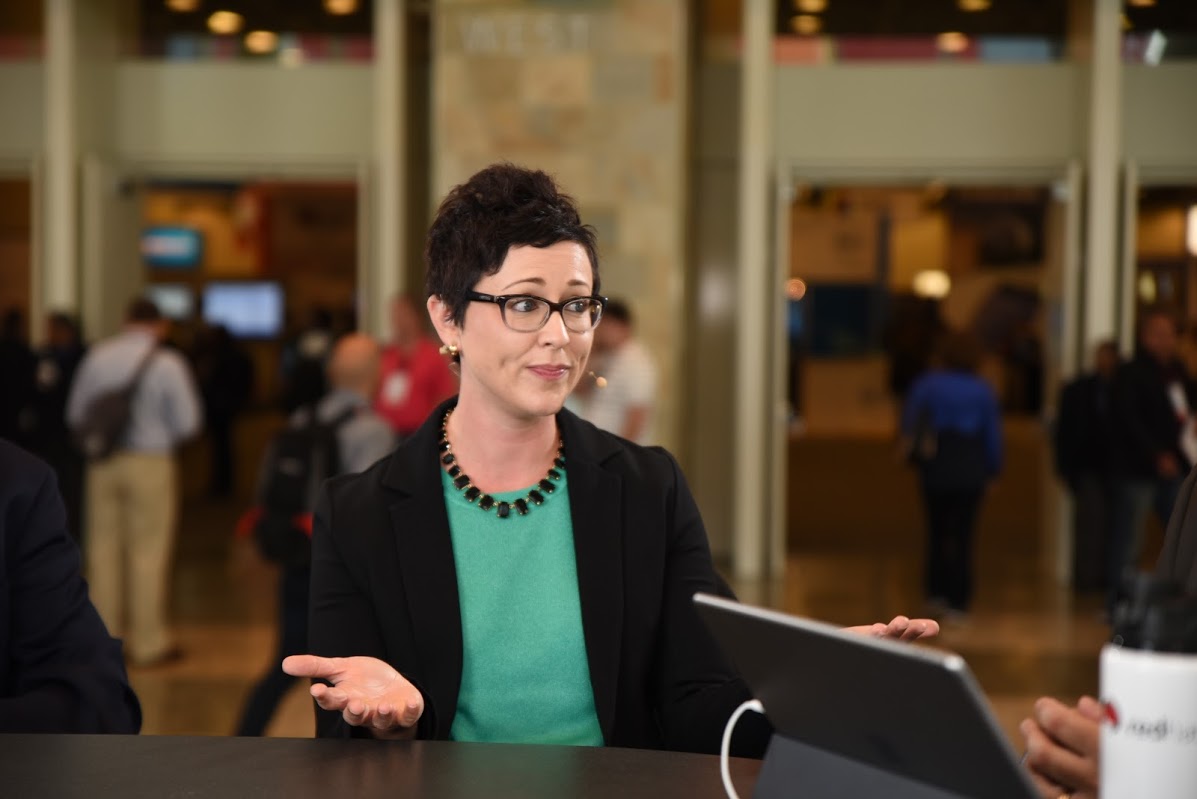 NEWS
NEWS
 NEWS
NEWS
 NEWS
NEWS
As technology becomes more open, the healthcare industry is struggling with highly regulated privacy rules, making it a difficult journey to try and bring some openness into the doctor-patient relationship. OpenNotes, a national initiative, is trying to achieve a more open healthcare relationship by providing patients access to notes written by any clinician they visit, in an effort to better manage their health.
This week, SiliconANGLE features Liz Salmi, a brain cancer blogger and director of communications for the Coalition for Compassionate Care of California, as its Guest of the Week due to her dedication to helping patients become more involved with their own healthcare education.
Salmi joined a panel of those working with OpenNotes on theCUBE, from the SiliconANGLE Media team, hosted by Stu Miniman (@stu) during Red Hat Summit. Also on the panel were John Santa, director of OpenNotes dissemination at Beth Israel Deaconess, and Amy Fellows, owner and principal consultant of Fellows Health Connect, LLC.
Miniman opened the discussion with Salmi and asked her about her background and how she became involved in the initiative. Her own health scare was the catalyst.
“My professional background is I am a digital communicator. I make websites. I design graphics. And one week after my 29th birthday, I had a big seizure and was rushed to the hospital and found out I had a mass on my brain. Lo and behold, it was growing [and] we found out I had brain cancer. I had brain surgery, I went through chemotherapy and throughout that time I was looking for survivor’s stories on the Internet.
“You look up your diagnosis; you Google brain cancer; you see horrible facts out there. So as somebody with a digital communications background, I thought, I’m just going to go open with my story and be the person I was looking for online to say, ‘Hey, I’m a survivor. I’m still alive, and this is what brain surgery is like, this is what chemotherapy is like,’ hoping that, maybe, perhaps other folks might get some information out of the information I had to share.”
Santa told Miniman that 99 percent of patients want access to their healthcare provider’s notes, and yet the hierarchy of the healthcare system is preventing transparency. Salmi provided the patient’s view.
“Not every patient is going to want to approach their healthcare story the same way that I do, and not every patient wants to read every single note their doctor might write about them after an appointment. But some do, and no one has ever died from a Google search. But the paradigm is changing the way people are consuming healthcare. If we are interested in a new diet or the new Fitbit technology, we’re going to look up reviews from other people who are engaging with that product. The same is going on with healthcare. The future is that we want to see ourselves at the same levels as our providers. We want to be participants in our care.
“So what’s great about OpenNotes is after you have that visit with your provider, you actually can go and read and remember what they said. Not everybody brings a notebook into the doctor’s office and writes down the exact conversation. To be able to go back and read your provider’s recommendations actually keeps patients on track. [The] 99 percent of patients are not only likely to read what the notes are, but they’re more likely to do what the doctor recommends, take the medication in the right way and take the advice that their provider has given to them. So this is just the future where any industry is going, and healthcare just needs to keep up with that.”
Santa talks to doctors about the program, and he explained that with OpenNotes, patients seem to trust their doctors more. Miniman asked Salmi about the trust factor.
“When you’re diagnosed with something serious, or a chronic condition, as a patient you are already looking to your clinician as the expert. And you don’t know what you can do [in regard to the disease]. And you say, ‘Tell me what I need to do?’ And then we go back in secret on our own and Google stuff and look things up on the Internet. Then we bring things back to our providers and say, ‘Hey, I just heard of this thing.’ And we all do it because we are all patients.
“So with something like OpenNotes, it allows … you to have these conversations with them at the clinic or in the actual hospital. You can remember what they said and go back to them and start that two-way conversation about what it is you’re learning.”
Salmi closed the panel by talking about her blog and other online health support communities. She said these online resources are helping clinicians see their patients as partners in their own care.
“As far as patients who are telling their story online, my brain cancer blog is Lizarmy.com, but I’m not the only one who’s writing about living with cancer or living with a long-term illness. There are many others. There are amazing Twitter communities for patients, where they can connect with providers and talk about different conditions. And I would definitely look up the Healthcare Hashtag Project, where they chronicle and outline all the different hashtag communities for people with breast cancer, lung cancer, you name it.
“It’s an easy way to kind of get in there. So if you get diagnosed with anything in the future, you can actually find a support community that is knowledgeable, that’s connecting and seeing patients as partners in their own healthcare.”
Watch the full interview below, and be sure to check out more of SiliconANGLE and theCUBE’s coverage of the Red Hat Summit.
THANK YOU